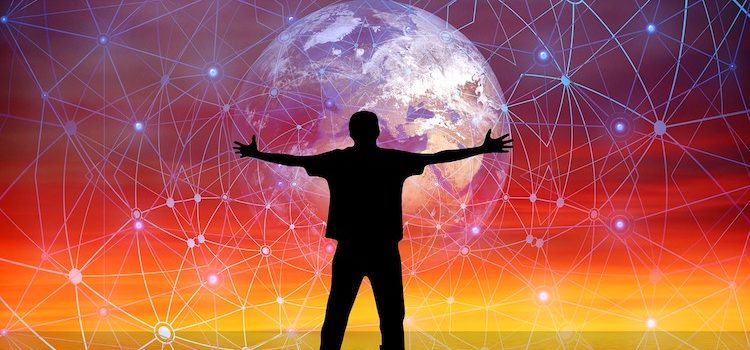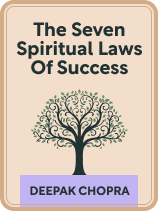

This article is an excerpt from the Shortform book guide to "The Seven Spiritual Laws of Success" by Deepak Chopra. Shortform has the world's best summaries and analyses of books you should be reading.
Like this article? Sign up for a free trial here .
What is thought-energy? How might it help you feel connected and experience joy?
According to Deepak Chopra, the thought-energy that lives within the spiritual realm gives birth to and lives within all matter in the universe: In other words, everything you see, hear, smell, taste, or touch is simply a reflection of all of the thoughts that live in this spiritual realm. This thought-energy connects everything, and this connection can help you live more joyfully.
Read more to learn about Chopra’s idea.
Thought-Energy Connects Us All
Chopra claims that, by flowing through everything in the universe, this thought-energy connects us all. It uses this connection to synchronize all of the interactions that govern and underlie the universe.
For example, we rely on the complex process of photosynthesis to keep the atmosphere in balance so that we can breathe, but we don’t need to learn how to breathe or explain to trees how to convert carbon dioxide into oxygen. Rather, the spiritual realm provides all organisms in the universe with inherent knowledge and instincts that allow them to effortlessly interact with other organisms to support the survival and reproduction of all.
Chopra argues that there’s no separation between you and the spiritual realm: Everything you experience is a result of the interaction between your thoughts and the thought-energy that lives within the spiritual realm—even if you’re not aware of it. He explains that when you’re unaware of your inherent connection to the spiritual realm, you identify with physical reality—as we’ll see in the following section, this hinders your ability to feel successful.
| The Purpose of Life Is to Experience “Oneness” Chopra’s ideas about how the spiritual realm gives birth to all of your experiences are inextricably linked to Advaita Vedanta, a branch of Hindu philosophy that originated in the eighth century. A core belief of this philosophy is that there’s no separation between God, consciousness, and reality. The purpose of life is to directly experience “oneness” with all three of these aspects to overcome any separation you feel from your environment and other people. This feeling of “oneness” is akin to “knowing God.” According to this philosophy, you experience “oneness” when you recognize that your reality is merely a reflection of the interplay between your thoughts and your experiences, as well as the interplay of collective consciousness (other people’s thoughts) with reality. However, your identity, or what you believe defines you as an individual, prevents you from developing this awareness by encouraging the misperception that you’re separate from God or others. For that reason, Advaita Vedanta practitioners focus on releasing their identity so that they can achieve this feeling of “oneness.” |
Finding Joy With the Flow of Thought-Energy
Chopra argues that when you accept and feel your connection to the spiritual realm, your approach to life dramatically changes. Instead of filling you with fear, your life works with the flow of universal thought-energy and therefore brings you joy. Let’s explore Chopra’s explanation of why connecting to the spiritual realm helps you live more joyfully.
You Feel Connected to Others on an Energetic Level
Chopra explains that when you feel the same energy that creates galaxies flowing within you, you can appreciate how your thoughts contribute to the complex flow of thought-energy that permeates everything in the universe.
Consequently, you’re able to perceive how you’re connected on an energetic level to each and every person. This feeling of connection changes how you regard yourself and others: Instead of judging yourself and others based on achievements or possessions, you accept that every person is inherently worthy and has equal value—because you’re all born from the same thought-energy. This encourages you to send only positive energy to others because the energy you send out eventually flows back to you.
| Your Ego Prevents You From Recognizing Your True Nature In The Power of Now, Eckhart Tolle expands on the concept of energetic connection by explaining how your ego may block you from appreciating your inherent connection to others. According to him, everyone has a “true being” that connects them to every other living thing on earth through eternal life energy. Like Chopra, Tolle argues that recognition of this connection encourages compassion toward all sentient beings. However, you also have an ego and its job is to form and protect your identity—from your ego’s perspective, everything you’ve achieved or acquired demonstrates how unique you are and forms the basis of your identity. But this ego-inspired identity is entirely superficial, cloaks your “true being,” and separates you from everyone else. Tolle explains that your ego leads you to misperceive others through a lens of judgment that confuses their superficial identities with who they really are. In other words, your ego only sees and responds to other egos. The more you act under the influence of your ego, the more superficial your interactions with others become. As a result, you forget your “true being,” fail to recognize it in others, and hinder your ability to feel true empathy or compassion for others. |
You Understand That Who You Are Is More Important Than What You Have
According to Chopra, the more aligned you feel with the spiritual realm, the more you realize that your external circumstances are just a reflection of the thought-energy you’re sending to the spiritual realm. Therefore, you can change what’s reflected back to you externally by shaping your thought-energy to match what you want. For example, if you want to experience love, think loving thoughts to create more of it in your life. This knowledge grants you internal power that doesn’t rely on other people or things being a certain way.
(Shortform note: The idea that reality is simply a reflection of your thoughts is not new—many self-help practitioners argue that “your thoughts create your reality.” For example, in The Secret, Rhonda Byrne claims that your thoughts work like magnets to attract specific experiences into your life. And, like Chopra, she argues that aligning your attitude with what you want helps overcome feelings of powerlessness in unpleasant situations. She suggests that you can intentionally change your reality by downplaying what you don’t like about your life, feeling grateful for what’s going well, and focusing your thoughts and feelings only on what you do want.)
Inevitably, Chopra argues, you’ll place greater precedence on your awareness of your true nature as a spiritual being than your awareness of your external reality. Realizing that your external reality can only ever match the energy that you send out encourages you to focus more on how you feel internally than external “success.” Consequently, you pay more attention to your overall well-being and the impact you have on other people and your environment. This change in focus inspires you to commit to goals that feel meaningful to you and contributes to a joyful and sustainable feeling of success.
| Awareness of Your True Nature Creates Positive Energy In The Power of Now, Tolle has a different take on how awareness of your “true nature” inspires you to act. According to him, the internal energy you emanate impacts everything around you, including your ability to feel happy. Therefore, instead of explaining how spiritual awareness changes your behaviors and goals, as Chopra does, Tolle focuses on how increased awareness changes your entire outlook on life, improves your internal energy, and positively influences the world around you. Tolle argues that acting under the influence of your ego creates negative energy that harms your relationships and damages the planet. We previously explained how your ego’s job is to form and protect your identity. All aspects of this identity revolve around external factors, such as your nationality, culture, education, career, relationships, and achievements. You believe that these external factors define you, and when something happens to threaten your identity (for example, losing your job), you feel distress, contaminate the world with your negative energy, and get stuck in a cycle of negativity. On the other hand, being aware of and acting under the influence of your “true being” creates peaceful energy that promotes harmony in your relationships and restores the environment. Tolle argues that your “true being” doesn’t need things to be a certain way to avoid distress because external forces and circumstances don’t affect it—your “true being” is always at peace. Instead of viewing every interaction and experience as a potential threat to your identity, you view it as something that simply is. This stance allows you to accept things that happen without feeling the need to fight the situation or coerce others. As a result, you send peaceful and positive energy out into the world and feel inspired to maintain this positive energy. |

———End of Preview———
Like what you just read? Read the rest of the world's best book summary and analysis of Deepak Chopra's "The Seven Spiritual Laws of Success" at Shortform .
Here's what you'll find in our full The Seven Spiritual Laws of Success summary :
- Why success isn't based on how much you achieve or accumulate
- How true success comes from aligning with the flow of spiritual energy
- Chopra's five methods for connecting with thought-energy







Fantastic summary. The new readers digest for self awareness-improvement.